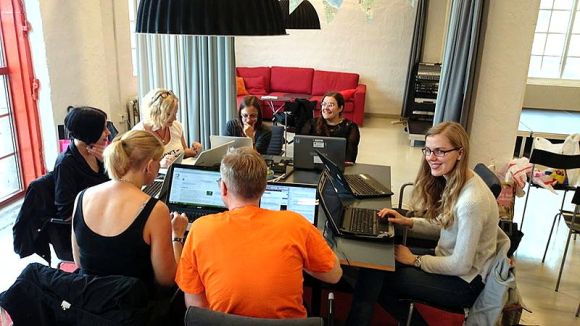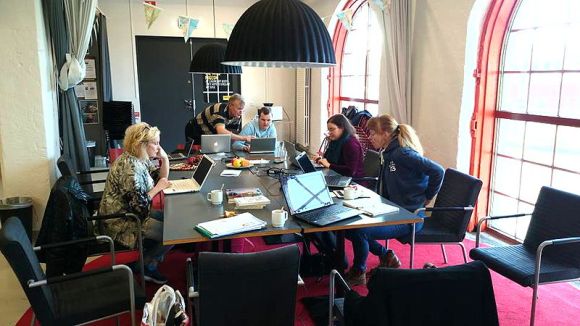
“Edit-a-thon photo” by Lennart Guldbrandsson, licensed under CC-Zero
During 2014, Wikimedia Sverige organized a new series of regular edit-a-thons and workshops focused on the Gender gap issue. This is what we learned from one of these projects.
In March, we started to hold weekly edit-a-thons in Gothenburg, the second largest city of Sweden. The topic was formally “main female characters” (“kvinnliga huvudpersoner”), but we essentially let people write about what they wanted, while trying to gently steer them towards literature and/or women. For example, we tried to steer them toward topics like female authors, or seminal works in women’s literature such as “The Mad Woman in the Attic.” Men and women were all welcome.
Altogether we ran 35 edit-a-thons, each running on a Tuesday from 13.00 onwards. About 15 different Wikipedians edited over 100 different articles. The result was 11 articles reaching “recommended status” (ranking just below Good articles) with more on their way. (We of course want to improve on this for next year.) A full list of articles they worked on, sorted by how far they have come, can be found on our project page.
This initiative was one of the most publicized Wikipedia/Wikimedia events in Sweden during 2014, with two national radio interviews, two podcast interviews and several news articles. We promoted this on flyers and on the large Book Fair in Gothenburg, and have started to gather a very good reputation. We hope to see the same type of regular edit-a-thons get off the ground in other cities in Sweden during 2015.

“Edit-a-thon photo” by Lennart Guldbrandsson, licensed under CC-Zero
So, what have we learned?
- We could not have done this without a small group of dedicated people who showed up nearly every time. We were four persons (two women, two men). Being a group of “all volunteers” led to very little bureaucracy during the edit-a-thons themselves and sometimes led to edit-a-thons running over by several hours. Making sure that the edit-a-thons didn’t depend on any one person was an early priority.
- We had access to a free space with wifi and a kitchen. Each time, Wikimedia Sverige sponsored coffee/tea, sandwiches and fruit – and gingersnaps and other seasonal treats. Don’t underestimate the power of “fika” — the Swedish word for “coffee and cake”. All in all, the cost of all 35 edit-a-thons was around 240-250 USD.
- We have two lines of communication: both the project page, and our Facebook group, where we could remind people to come and get them to invite others who aren’t on Wikipedia yet. Personal invitations work much better in the long run – getting people to come back week after week.
- The topic was very well chosen. Many people are interested in literature and the topic is underdeveloped on Wikipedia, so it was easy to explain the need to outsiders. But it has also been good to allow some leeway and not adhere strictly to any predetermined list of articles to edit. Sometimes interesting topics crop up in conversation or a bad article was discovered during fact checking and then we encouraged people to edit that article.
- Some people wished the edit-a-thons were held on other days or at other times. This may have contributed to the sometimes very low attendance rates. We have tried to take that into account, and are thinking about how to manage regular weekend edit-a-thons. We are also considering ways to get the people who are most interested in going to those edit-a-thons to also run them (empowering them, in effect).
- There are always going to be a few people who only come one time, just to see what we’re about. Especially after we put in small weekly ads (for free).
- We took turns doing the introduction and making sure the newcomers made a few edits, so that as many Wikipedians as possible had done the introduction, and also to make sure that the Wikipedians themselves could have time to edit. That’s also what we tried to do with the radio and podcast interviews, in order to prevent any one person becoming “the representative Wikipedian.”
- You also shouldn’t underestimate how helpful this is for stressed Wikipedians with normally very little time to edit Wikipedia to set aside time to do so.
During the winter holiday, when the editathons took a few weeks off, demand for more meetings was so high that we organized a Hangout remote edit-a-thon session, just to relieve our feelings of abstinence. We already look forward to our first edit-a-thon of 2015.
Lennart Guldbrandsson, volunteer on Swedish Wikipedia

Can you help us translate this article?
In order for this article to reach as many people as possible we would like your help. Can you translate this article to get the message out?
Start translation